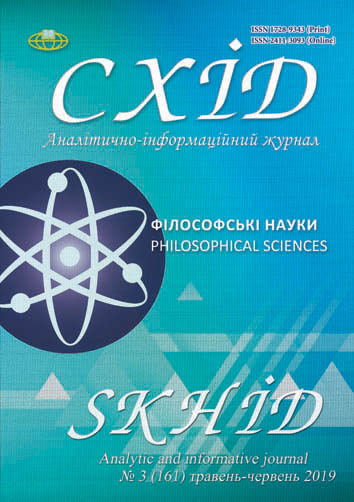The axiological potential of the holiday in the development of the collective memory
DOI:
https://doi.org/10.21847/1728-9343.2019.3(161).171816Keywords:
axiology, cultural identity, cultural memory, cultural practice, holidayAbstract
The axiological potential of the holiday is uncovered in the article not as the form of the collective memory because of as the integral part of the culture which is appeared with the formation of the human society and it is accompanied it during all history. The holiday is not so the form as the content component of the culture which presents the values and the meanings of each epoch. At one time it forms the socio-cultural space, and it functions in it. This uninterrupted process provides the permanent actuality of the holiday for the society. Base upon on the heuristic potential of the cultural memory which is arisen as the uninterrupted process of the accumulation, the reproduction and the creation of the human knowledge about its cultural identity, the authors uncover the potentiality of the holiday as the cultural practice which does the functions of the cultural integration, the consolidation of the society and it is the way of the broadcasting, the presentation, the creation and the existence of the meaningful for the particular cultural community’s meanings and the values. The reasons of the incomplete deployment of the axiological potential of the holiday in the social reality are analyzed and the conditions of the fixed holiday in the public consciousness are determined. It is proved the necessity of the providing of the historical and the cultural heredity of the traditions, "embedded" in the mechanism of the collective identification, the value-semantic communication, etc. Each new social formation tries to unite its members. For this purpose, the system of the historical mythologies is created which will establish the heredity and it will define the limits of the new society. As a result, the sacralization of the list of the holidays is occurred which begins to perceive as the integral element of the preservation of the collective identity. The fixing of the holiday is not only in the official calendar, but above all in the social consciousness, it will be possible only under conditions if it is provided the historical and the cultural heredity, which is supported by the traditions, in the other hand, the semantic content of the holiday will be lost. The holidays without support in the cultural memory do not get definition and cannot be considered as the holidays in the full measure of this concept, which includes not only the external design, the rituals, the ceremonies, the traditions of the celebration, and, above all, the reflexive and the emotional reproduction of the event as socially meaningful. The success of the beginnings and the preservation of each holidays are directly related to its "embedded" in the mechanism of the collective modern identification.Downloads
References
Arnaiutova, Y. E. (2003). From memoria to "memory history". In Gurevich, A. Y. (ed.). Odyssey. Man in history. Moscow: Nauka, pp. 170-198. (In Russian).
Assman, Y. (2004). Cultural memory: letter, memory of the past, and political identity in the high cultures of antiquity (Trans. from German by M. M. Sokolskaya). Moscow: Languages of Russian Culture, 363 p. (In Russian).
Belov, I. (Ed.) (2015). Dialogue Guide. (Trans. by D. Wiren, A. Davtyan, V. Okun). Seini: Fond “Pogranichije”, 590 p. (In Russian).
Berk, E. (1979). Philosophical study of the origin of our ideas of sublime and beautiful. (Trans. from English by B.V. Meerovskii). Moscow: Progress, 237 p. (In Russian).
Cassirer, E. (2002). The philosophy of symbolic forms. Mythological thinking: in 2 vol. Vol. 2. M.; SPb.: University book, 280 p. (in Russian)
Eksle, O. G. (2003). Aristocracy, memoria and cultural memory. The images of the past and the collective identity in Europe before the beginning of the New Age. M.: Krug, pp. 38-51. (In Russian).
Eliade, M. (2010). Aspects of the myth. Trans. from French by V.P. Bolshakova. M.: Academic Avenue, 256 p. (In Russian).
Hassen, S. (2001). Exemption from the psychology of violence. SPb.: Prime-Eurovision, 400 p. (In Russian).
Khalbvaks, M. (2005). Collective and historical memory. Inviolable reserve, № 2/3 (40/41). Retrieved from http://magazines.russ.ru/nz/2005/2/ (In Russian).
Khrenov, N. А. (2002). Culture in the era of social chaos. M.: Editorial URSS, 448 p.
Lotman, Y. M. (1992). Memory in cultural lighting. Selected articles: in 3 vol. Vol.1. Tallinn: Alexandra, 478 р. (In Russian).
Maltseva, O. (2012). Assimilation of the holiday and festive laughter in the broader routine: the causes, mechanisms and consequences of the phenomenon. Skhid, 4 (118), pp. 144-149. Retrieved from http://skhid.kubg.edu.ua/article/view/16574 (in Ukrainian).
Proleev, S. V. (2014). "Society of knowledge" as an anthropological situation. Philosophy of Education, №1 (14), pp. 7-24. (In Ukrainian).
Downloads
Published
How to Cite
Issue
Section
License
Copyright (c) 2019 Olena Troitska, Olga Popravko, Nina Shcherbakova

This work is licensed under a Creative Commons Attribution-NonCommercial-NoDerivatives 4.0 International License.
1. Authors bear responsibility for the accuracy of facts, quotations, numbers and names used.
2. Manuscripts are not sent back.
3. The publisher does not always agree with the authors' opinion.
4. The authors reserve the right to authorship of the work and pass the first publication right of this work to the journal under the terms of a Creative Commons Attribution-NonCommercial-NoDerivatives 4.0 International License. This license allows others to distribute (copy) the published work for non-commercial purposes, provided there is mandatory attribution to its authors and a link to the first publication in our journal.
5. The authors have the right to conclude separate supplement agreements that relate to non-exclusive work distribution in the form in which it has been published by the journal (for example, to upload the work to the online storage of the journal or publish it as part of a monograph), provided that the reference to the first publication of the work in this journal is included.

